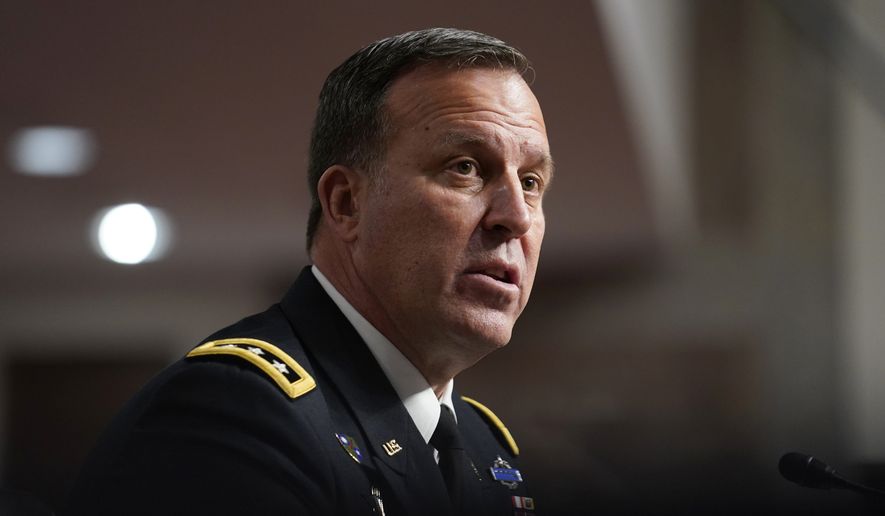President Biden’s nominee to lead U.S. Central Command told lawmakers Tuesday that America should not lose sight of the Middle East even as the nation’s geopolitical focus has shifted to the Indo-Pacific region and Eastern Europe.
The Middle East and Afghanistan remain zones of uncertainty with key U.S. national interests and allies at risk, Army Lt. Gen. Michael “Erik” Kurilla told the Senate Armed Services Committee during his confirmation hearing.
“This is a critical time for the 21 countries of Central Command,” Gen. Kurilla said “The United States faces a new era of strategic competition with China and Russia that is not confined to one geographic region and extends into the CENTCOM area of responsibility.”
The area that would fall under his supervision remains a “dangerous theater” with its own internal threats to U.S. security, Gen. Kurilla said, prime among them Iran and a host of still-dangerous terror groups.
“The Middle East is home to nine of the top 10 violent extremist organizations, including al Qaeda and Islamic State, which are both reconstituting,” he said.
Mr. Biden nominated Gen. Kurilla, a West Point grad who served in both Iraq and Afghanistan, for promotion to four stars and command of U.S. Central Command, which is based in Tampa, Florida. Its area of responsibility includes the Middle East, Central Asia, and parts of South Asia.
If confirmed by the Senate, Gen. Kurilla will succeed Marine Corps Gen. Frank McKenzie, who has been in charge at Central Command since March 2019.
Gen. Kurilla will inherit a heavy workload, including potential blowback from the U.S. military’s withdrawal from Afghanistan and the lack of U.S. forces on the ground there for the first time in 20 years. He said during the hearing he favored a “pragmatic” relationship with the new ruling Taliban, suggesting the Taliban and the U.S. have a joint interest in stability and defeating the threat of a resurgent Islamic State.
While Russia dominates the headlines and the military services reorient to face the challenge of a rising China, the general said the focus on the Middle East cannot be abandoned overnight.
“We must remain engaged in the Middle East. It remains home to America’s national interests,” Gen. Kurilla said.
Gen. Kurilla is currently commander of the 18th Airborne Corps based at Fort Bragg, North Carolina, which recently sent troops to Germany to support NATO allies in light of a Russian troop build-up on its border with Ukraine. He told the Senate that immediately after his testimony, he would be flying to Germany to help oversee operations there.
At the hearing, Gen. Kurilla called Iran the “No. 1 destabilizing factor” in the Middle East. He said strengthening partners and allies is the best way to counter their “malign influence” and said it is crucial to ensure Tehran is prevented from obtaining nuclear weapons.
Iran’s growing influence in the region will likely be the most pressing matter for Gen. Kurilla at Central Command, said Senate Armed Services Committee Chairman Jack Reed, the Rhode Island Democrat who chaired the meeting.
“Iranian-linked groups continue to mount drone and rocket attacks in the region, including against bases in Iraq and Syria with a U.S. military presence,” Mr. Reed said.
Sen. Jim Inhofe, Oklahoma Republican, said he was concerned Iran would spend at least part of the sanctions relief money it could receive if the Iran nuclear deal is revived on terrorist proxies.
Gen. Kurilla agreed with Sen. Inhofe to a point.
“Senator, there is a risk with sanctions relief that Iran would use some of that money to support its proxies and terrorism in the region. If they did, it could increase risk to our forces in the region,” Gen. Kurilla said.
Gen. Kurilla received a relatively warm reception from lawmakers, several of whom said it was likely his nomination would be confirmed by the full Senate.
• Mike Glenn can be reached at mglenn@washingtontimes.com.




Please read our comment policy before commenting.